2021 Year in Review: The Collaboration
2021 Year in Review: The People 2021 YEAR IN REVIEW: THE RESEARCH
The Purdue Department of Forestry and Natural Resources aims to spread the word about cutting-edge techniques of natural resources management through collaborations with many outside partners and stakeholders. In addition, in 2021 FNR personnel were directors of six affiliated centers and a part of four major long-term research projects. This story will highlight the accomplishments of FNR's collaborative efforts.
Awards/Media Highlights
The transformation of the Columbian Park lagoon, which was a collaborative effort between Lafayette Parks and Recreation, Purdue FNR, and the Indiana Department of Natural Resources received the Tree Lafayette Environmental Award.
Purdue Extension wildlife specialist Jarred Brooke's work with prescribed fire is now being used to educate a new audience about various techniques of the habitat management method, the Wounaan indigenous community of Panama among others, thanks to a collaboration with the United States Forest Service.
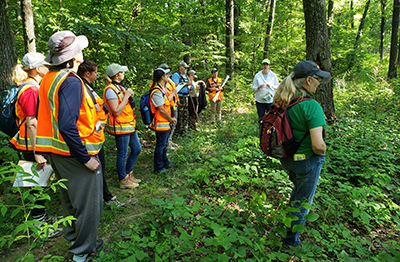 The Natural Resources Teacher Institute (NRTI), involving FNR Extension forester Lenny Farlee as well as members of the Hardwood Ecosystem Experiment, hosted nine classroom teachers for a five-day program, which introduced educators to Indiana forests through the lenses of public and private forest management, a long-term forest research project, forest products and industry, and the diversity of plant and animal communities supported by forests. The NRTI is a collaborative effort of the Indiana DNR Division of Forestry, the Hardwood Ecosystem Experiment, the Indiana Forestry Education Foundation, and the Indiana Forestry and Woodland Owners Association.
The Natural Resources Teacher Institute (NRTI), involving FNR Extension forester Lenny Farlee as well as members of the Hardwood Ecosystem Experiment, hosted nine classroom teachers for a five-day program, which introduced educators to Indiana forests through the lenses of public and private forest management, a long-term forest research project, forest products and industry, and the diversity of plant and animal communities supported by forests. The NRTI is a collaborative effort of the Indiana DNR Division of Forestry, the Hardwood Ecosystem Experiment, the Indiana Forestry Education Foundation, and the Indiana Forestry and Woodland Owners Association.
Students from the Purdue chapter of the American Fisheries Society were part of an effort to begin restocking the newly renovated lagoon at Columbian Park in Lafayette last week. Alongside professionals from the Indiana Department of Natural Resources and the City of Lafayette, the students helped stock and tag more than 900 largemouth bass.
The Woods on Wheels project, a travelling exhibit that will be educating residents of all ages across the state, is a collaborative effort of the Indiana Department of Natural Resources (DNR), the Indiana Hardwood Lumbermen's Association (IHLA) and Purdue FNR. Woods on Wheels traveled more than 10,000 miles in 2021 and was visited by more than 14,600 individuals, including more than 10,000 at the Indiana State Fair. FNR alumna Sara High was featured for her role as the Woods on Wheels operator.
Two news articles talked about the bat research being conducted on the Hardwood Ecosystem Experiment: "In Pursuit of Indiana Bats" by the Illinois News Bureau and "Sending Up the Bat Signal on Forest Use by Endangered Species" by the Illinois College of Agricultural, Consumer and Environmental Sciences.
Center for Global Soundscapes
- Director: Dr. Bryan Pijanowski
- The Discovery Park Center for Global Soundscape's mission is to support discovery, learning and engagement activities that lead to the preservation of the Earth's natural acoustic heritage.
Dr. Bryan Pijanowski began work on a three-year project "CNH2-L: Using Sound to Advance Conceptual Frameworks of Resilience of Integrated Grassland-Pastoralist Systems" in May 2021. The project is sponsored by the National Science Foundation.
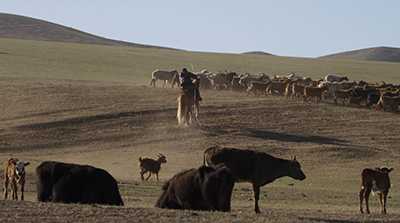 Pijanowski's research on "How Sound Drives Mongolian Herder Cultural Practices" was featured. He also spoke on The Animal Turn podcast about soundscape and sound ecology.
Pijanowski's research on "How Sound Drives Mongolian Herder Cultural Practices" was featured. He also spoke on The Animal Turn podcast about soundscape and sound ecology.
Pijanowski was selected by the Purdue College of Agriculture as one of 10 faculty Innovation and Entrepreneurship Ambassadors.
Hardwood Tree Improvement and Regeneration Center
- Director: Dr. Matt Ginzel
- The mission of the HTIRC is to advance the science and application of tree improvement, management, and protection of hardwood forests, with emphasis in the Central Hardwood Forest Region (CHFR).
The HTIRC advisory committee, staff and stakeholders met on Oct. 15, 2021, for their annual meeting to share progress on the center's goals, and exchange ideas regarding programs, products and new opportunities. Discussion topics included the development of a new strategic plan, extension and engagement activities, digital technology use in forestry and the center's association with the Center for Advanced Forestry Systems.
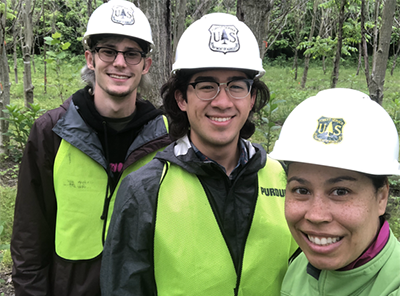 Over the summer, U.S. Forest Service scientists Drs. Shaneka Lawson and Anna Conrad mentored interns participating in the Research and Extension Experiential Learning for Undergraduates (REEU) program. The interns developed a project titled "Effects of Soil Characteristics on the Severity of Butternut Cancer Disease."
Over the summer, U.S. Forest Service scientists Drs. Shaneka Lawson and Anna Conrad mentored interns participating in the Research and Extension Experiential Learning for Undergraduates (REEU) program. The interns developed a project titled "Effects of Soil Characteristics on the Severity of Butternut Cancer Disease."
Digital forestry projects through the Integrated Digital Forestry (iDiF) initiative were announced as part of the Plant Sciences 2.0 strategic initiative of Purdue's Next Moves program.
HTIRC research topics include:
- Remote sensing to detect forest pests by associate Professor John Couture and master's student Ellie Joll
- Sustainability of the Eastern Hemlock (Tsuga canadensis) in Indiana by master's student Summer Rathfon, and Drs. Mike Jenkins and Keith Woeste.
Several publications came out of HTIRC research last year, including:
- Assessing the Benefits and Economic Feasibility of Stand Improvement for Central Hardwood Forests by Yangyang Wang in Forest Science.
- Using soft computing and leaf dimensions to determine sex in immature Pistachia vera L. genotypes by Mehdi Rezaei, Abbas Rohani, Parviz Heidari, and Shaneka Lawson in Measurement
Dr. Keith Woeste was promoted to USDA Forest Service Project Leader for the Forest Service portion of the HTIRC. He has been a research plant molecular geneticist with the HTIRC since its inception.
Illinois-Indiana Sea Grant
- Director: Dr. Tomas Hook
- With climate change upon us, as well as a host of other concerns, such as population growth, aquatic invasive species, contaminated waters, and loss of natural habitat, the southern Lake Michigan region faces many challenges. Illinois-Indiana Sea Grant (IISG), with its unique mandate to bring the latest science to those who can best use the information, serves a critical role in empowering people to solve problems in sustainable ways.
- Director's Blog – March 2022
- The Helm Magazine – October 2021
During the pandemic, IISG developed the Weather and Climate Explorer, the Pollution Prevention Explorer, and the Land and Water Nutrient Explorer, which offer educators a one-stop shop to find classroom resources on a variety of topics. Lessons can be filtered by age group, topic, learning mode and the time it takes to complete each activity. The Weather and Climate Explorer covers weather, climate, and climate change as well as flooding and stormwater, lake levels, energy and transportation. The Pollution Prevention Explorer teaches students about pollution that affects water resources and how to prevent it. The Land and Water Nutrient Explorer helps explain the impact of human activities on nearby lakes and streams.
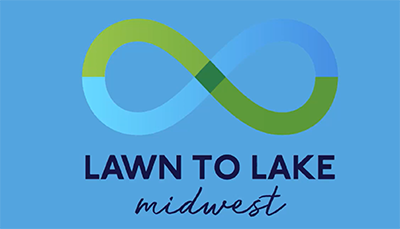 IISG, Purdue Extension and the University of Illinois Extension created the Lawn to Lake program to protect water resources by promoting healthy lawn and landscape practices.
IISG, Purdue Extension and the University of Illinois Extension created the Lawn to Lake program to protect water resources by promoting healthy lawn and landscape practices.
The Purdue Rainscaping Program continued to help communities reduce the threat of flooding, while preventing the flow of contaminants from pavement and other hard surfaces to nearby waterways. The 10 demonstration rain gardens in Indiana have reduced stormwater runoff by nearly 410,000 gallons each year. In 2021, Kara Salazar helped bring the rainscaping program to the state of Illinois, where it has been implemented into the University of Illinois Extension program.
In the coming months, IISG personnel are working to bring the Indiana Master Watershed Steward Program to Illinois as well.
The Sea Grant staff, led by assistant director Stuart Carlton, spread the word about the Great Lakes, ranging from aquatic invasive species to lake levels, bird ecology, water quality, water safety, fisheries and event regional politics with 21 new episodes of the "Teach Me About the Great Lakes" podcast.
Graduate students with funding from IISG researched topics from validating eDNA metabarcoding to assess Lake Michigan fish, using satellite images to monitor Lake Michigan's chlorophyll, analyzing Lake Michigan larval fish data and modeling Lake Erie hypoxia and its impact on fish habitat.
The Tipping Point Planner Project, a joint effort by Illinois-Indiana Sea Grant and Purdue Extension, was selected as a 2020 recipient of the Purdue College of Agriculture's TEAM (Together Everyone Achieves More) Award.- https://ag.purdue.edu/fnr/awards
Carolyn Foley, research coordinator for the Illinois-Indiana Sea Grant College Program, was named as the recipient of the 2021 Purdue College of Agriculture Unsung Diversity Hero Award for her efforts in championing diversity within FNR and in the broader Purdue and Indiana communities.
The Enhancing the Value of Public Spaces: Creating Healthy Communities Team was honored for its efforts by the Purdue Cooperative Extension Specialists' Association (PUCESA). The collaborative effort of Purdue Extension professionals from Forestry and Natural Resources, Health and Human Sciences, Supplemental Nutrition Assistance Program – Education Division (SNAP-Ed), and Community Development, as well as Illinois-Indiana Sea Grant, earned recognition as a PUCESA Team Award honoree. Kara Salazar, assistant program leader and extension specialist for sustainable communities, and Daniel Walker, community planning extension specialist were among the EVPS campus leadership team.
IISG Director Tomas Hook was named as the 2021 recipient of the Purdue College of Agriculture Research Award.
Hardwood Ecosystem Experiment
The Hardwood Ecosystem Experiment, planned as a 100-year project, studies forest management and its impacts. The project, initiated in 2006, aims to develop a proven system of forest management prescriptions to maintain desired populations of native plant and animal species and important communities such as those dominated by oak species; understand the response of targeted native wildlife and plant species to forest management, in order to identify the positive effects and mitigate the potential negative effects on species of conservation concern; assess public attitudes towards forest management to develop new approaches for the education of the general public and private landowners; and to engage various interest groups in a discussion of proper land management; identify direct and indirect benefits of specific forest management practices to local and regional communities, and understand the impact of forest management practices in community development.
- Project Coordinator: Charlotte Owings
- Field Coordinator: Danielle Williams
- HEE Newsletters *To be added to the HEE newsletter email list, email Charlotte Owings at freemac@purdue.edu.
Projects on the HEE ranged from studies on vegetation to birds, mammals, reptiles and amphibians, insects, prescribed fire and fungi.
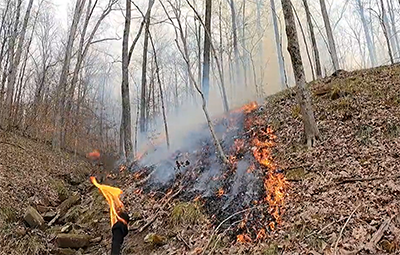 Ruffed grouse, which is a state-endangered species, was spotted in one of the HEE areas that were burned in the fall 2021. The last time a ruffed grouse had been seen on the HEE was in 2016.
Ruffed grouse, which is a state-endangered species, was spotted in one of the HEE areas that were burned in the fall 2021. The last time a ruffed grouse had been seen on the HEE was in 2016.
Three publications based on work at the HEE were released in 2021:
- Does the intrusion of an avian nest predator elicit a change in the behaviour of a canopy-nesting passerine? Behaviour. 1-26. by Sharp, A. and K. Islam. 2021.
- Northern long-eared bats roosting in a managed forest in south-central Indiana, Forest Ecology and Management, Volume 483,118928, by Bergeson, S.M., Confortin, K.A., Carter, T.C., Karsk, J.R., Haulton, S., Burnett, H. 2021.
- Effects of fire on ground-dwelling spider (Araneae) assemblages in Central Indiana Forests. Environmental Entomology, 50(4); 781-789. by Milne, M.A., Gonsiorowski, J., Tuft, N., Deno, B., Ploss, T., Acosta, J., Frandsen, L. and C. Venable.
Indiana Water Resources Research Center
- Director: Dr. Linda Prokopy
- The mission of the IWRRC is to coordinate the intellectual and physical resources of Indiana's universities, state agencies, and industries to resolve technical, economic, and other problems associated with water resources management, use, and preservation. The IWWRC supports research by administering the Section 104B program for the state of Indiana.
IWRRC awarded four grants to researchers from Ball State University and Purdue University.
IWRRC received a 104G Aquatic Invasive Species National Competitive Grant, which was awarded to Dr. Antoine Aubeneau at Purdue University. Project title: Freshwater Eco-Hydrological Connectivity: A Transport Network for Invasive Species
IWRRC continued its participation in the North Central Region Algal Bloom Action Team, which is comprised of representatives from Extension and the Water Resources Research Institutes at each of the land-grant universities within the North Central Region. The team hosts host bi-monthly webinars, an annual research symposium, and produces factsheets, FAQs, etc. to make emergent Harmful Algal Bloom research accessible to agriculture and natural resource educators across the region.
Purdue Climate Change Research Center
- Director: Dr. Jeff Dukes
- The Purdue Climate Change Research Center (PCCRC) facilitates interdisciplinary climate change research, education, and engagement. The center supports climate change research at Purdue to improve understanding of the causes and consequences of the Earth's changing climate system and enhance the capacity of decision-makers to develop effective mitigation and adaptation strategies.
- 2020 Annual Report
- Indiana Climate Change Impacts Assessment Resources
PCCRC began its Farming for a Better Climate (F4ABC) series in 2021. Topics have included soil organic matter, soil tillage, cover crops, nutrient management, animal management and manure management.
PCCRC co-hosted a Dynamics of Climate Workshop in April 2021 along with the Environmental Education Society of America and Tippecanoe Parks and Recreation. The event focused on informing educators and other adults interested in learning about global warming and climate change.
The Indiana Climate Change Assessment research was featured across 11 articles in a special issue of the journal Climatic Change.
It was announced in April 2021 that Purdue would be the host for the Midwestern Regional Climate Center, which would be directed by Indiana state climatologist Beth Hall.
 The PCCRC supported the Indiana Land Use Summit workshop, co-hosted by Purdue Extension and the Indiana Land Resources Council.
The PCCRC supported the Indiana Land Use Summit workshop, co-hosted by Purdue Extension and the Indiana Land Resources Council.
Two Purdue College of Agriculture professors, Sylvie Brouder and Dominque van de Mensbrugghe, were appointed to the Environmental Protection Agency's Science Advisory Board. Brouder is a professor of agronomy, while van der Mensbrugghe is director of the Center for Global Trade Analysis and a research professor in agricultural economics.
With discussions on what collective action must be taken to decrease fossil fuel emissions that lead to warming and extreme weather events happening on the world stage, the PCCRC released animations to illustrate what is happening in Indiana. The animations and related content were produced to coincide with the Glasgow Climate Change Conference.
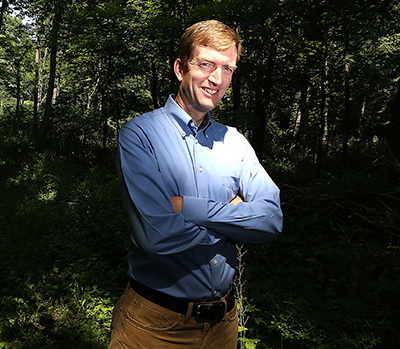 Research from the PCCRC included topics ranging from improving biofuel feedstocks to climate-induced extinctions of woody plants to future threats to Indiana's water resources and climate change exacerbating health risks to farmworkers.
Research from the PCCRC included topics ranging from improving biofuel feedstocks to climate-induced extinctions of woody plants to future threats to Indiana's water resources and climate change exacerbating health risks to farmworkers.
On Jan. 1, 2022, Jeff Dukes, professor of Forestry and Natural Resources and Biological Sciences and the Belcher Chair for Environmental Sustainability, ended his tenure as Director of the Climate Change Research Center. Dukes was appointed as director of the PCCRC in 2014, after serving as associate director in 2013-14.
Tropical Hardwood Tree Improvement and Regeneration Center
- Director: Dr. Doug Jacobs
- The Tropical HTIRC mission is to advance the science and application of tree improvement, management, and protection to improve tropical hardwood forests, with emphasis on the Hawaiian Islands.
- 2020 Annual Report
TropHTIRC hosted its annual advisory committee meeting at Hāloa ʻĀina over the summer.
In 2021, TropHTIRC added two members to its Steering/Advisory Committee, which provides guidance on the strategic directions of the center, prioritization of research themes, and staffing. Kualiʻi Camara with the Department of Hawaiian Home Lands (DHHL), and Neil Hannahs, Paniolo Tonewoods.
The group developed its 2022-26 strategic plan, while outlines objectives in research/development, education, extension and capacity building over the next five years. These goals include pursuing new lines of research with 'iliahi (sandalwood) and 'ōhi'a, while also maintaining a strong program in koa. TropHTIRC will also continue to emphasize its graduate training opportunities at Purdue University and University of Hawai'i at Mānoa, and will work hard to recruit local (and Native) Hawai'i students that are likely to pursue careers working on natural resource issues in Hawai'i.
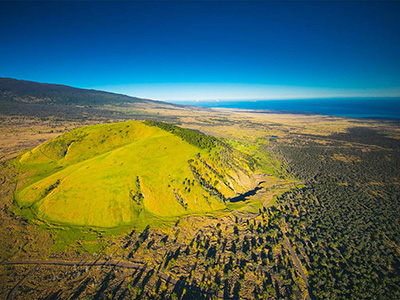 TropHTIRC has several projects in process. Projects continue to emphasize koa, a keystone Hawai'i native forest canopy tree, including cold tolerance, population ecophysiology, seed scarification, disease resistance, and grafting. Research also describes a large, multi-partnered effort investigating community-based forests management in Hawai'i. Projects regarding other important native Hawai'i forest trees, include a better understanding 'iliahi regeneration, focusing on nursery nutrition, haustoria development, and relationship with host species. ʻŌhiʻa research includes ROD disease resistance and chemical ecology of ROD.
TropHTIRC has several projects in process. Projects continue to emphasize koa, a keystone Hawai'i native forest canopy tree, including cold tolerance, population ecophysiology, seed scarification, disease resistance, and grafting. Research also describes a large, multi-partnered effort investigating community-based forests management in Hawai'i. Projects regarding other important native Hawai'i forest trees, include a better understanding 'iliahi regeneration, focusing on nursery nutrition, haustoria development, and relationship with host species. ʻŌhiʻa research includes ROD disease resistance and chemical ecology of ROD.
Here's a look at some of the research and happenings with graduate students and postdocs working with the Tropical HTIRC.
- Achyut Adhikari (University of Hawai'i at Mānoa) defended his MS thesis on koa disease resistance and is working to publish his research; he has since begun a PhD program at UH Mānoa.
- Aziz Ebrahimi continues his dissertation research at Purdue and is now working to publish his research on frost tolerance in koa populations.
- Rebekah Ohara continues her dissertation research on community managed forests at Purdue, while also serving as CEO of Akaka Foundation for Tropical Forests.
- Dr. Indira Paudel is working to publish a complex study on eco-physiology of resource co-limitation among koa populations across elevation gradients.
- Dr. Kyle Rose, part-time research scientist continues to collaborate on 'iliahi research and is working to publish research on koa grafting.
- Kylle Roy, Alfred P. Sloan Scholar, continues her dissertation research at Purdue studying chemical ecology of beetles, fungi, and ʻōhiʻa trees in association with Rapid ʻŌhiʻa Death (ROD). She just successfully passed her preliminary exams and has now advanced to doctoral candidacy!
- In March 2021, Emily Thyroff became a doctoral candidate at University of Hawai'i at Mānoa, after successfully defending her dissertation research proposal on 'iliahi restoration at Kealakekua Mountain Reserve.
- Tawn Speetjens continues his MS research at Purdue on 'iliahi, working collaboratively with Hāloa 'Āina to improve nursery cultural practices and field establishment. During 2021, Tawn was named an Alfred P. Sloan Scholar through the Sloan Foundation Indigenous Graduate Partnership.






